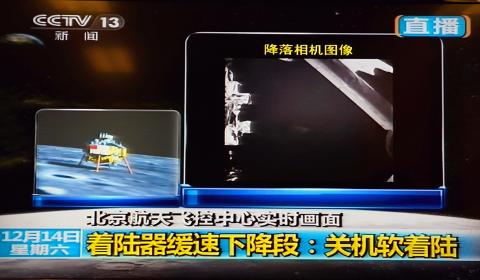A space module carrying China’s first lunar rover landed on the moon last night, state television showed, the first soft landing on the moon in nearly four decades and a major step for the emerging superpower’s ambitious space program.
Scientists burst into applause as a computer generated image representing the spacecraft was seen landing on the moon’s surface via screens at a Beijing control center, state broadcaster China Central Television (CCTV) showed, 12 days after Chang’e-3 blasted off on a Long March-3B carrier rocket.
China is set to become just the third country to carry out a moon rover mission, following the US and the former Soviet Union, which made the last soft landing on the moon 37 years ago.

Photo: AFP / CCTV
The probe touched down on an ancient 400km wide plain known in Latin as Sinus Iridum, or the Bay of Rainbows.
The landing was previously described as the “most difficult” part of the mission by the Chinese Academy of Sciences in a post on Chang’e-3’s microblogging page on Sina Weibo, a Chinese Twitter equivalent.
The probe used sensors and 3D imaging to identify a flat surface. Thrusters were then deployed 100m from the lunar surface to gently guide the craft into position.
The landing marks the latest step in an ambitious space program, which is seen as a symbol of China’s rising global stature and technological advancement, as well as the Chinese Communist Party’s success in reversing the fortunes of the once impoverished nation.
It comes a decade after the country first sent an astronaut into space, and ahead of plans to establish a permanent space station by 2020 and eventually send a human to the moon.

‘ABUSE OF POWER’: Lee Chun-yi allegedly used a Control Yuan vehicle to transport his dog to a pet grooming salon and take his wife to restaurants, media reports said Control Yuan Secretary-General Lee Chun-yi (李俊俋) resigned on Sunday night, admitting that he had misused a government vehicle, as reported by the media. Control Yuan Vice President Lee Hung-chun (李鴻鈞) yesterday apologized to the public over the issue. The watchdog body would follow up on similar accusations made by the Chinese Nationalist Party (KMT) and would investigate the alleged misuse of government vehicles by three other Control Yuan members: Su Li-chiung (蘇麗瓊), Lin Yu-jung (林郁容) and Wang Jung-chang (王榮璋), Lee Hung-chun said. Lee Chun-yi in a statement apologized for using a Control Yuan vehicle to transport his dog to a

INDO-PACIFIC REGION: Royal Navy ships exercise the right of freedom of navigation, including in the Taiwan Strait and South China Sea, the UK’s Tony Radakin told a summit Freedom of navigation in the Indo-Pacific region is as important as it is in the English Channel, British Chief of the Defence Staff Admiral Tony Radakin said at a summit in Singapore on Saturday. The remark came as the British Royal Navy’s flagship aircraft carrier, the HMS Prince of Wales, is on an eight-month deployment to the Indo-Pacific region as head of an international carrier strike group. “Upholding the UN Convention on the Law of the Sea, and with it, the principles of the freedom of navigation, in this part of the world matters to us just as it matters in the

BEIJING’S ‘PAWN’: ‘We, as Chinese, should never forget our roots, history, culture,’ Want Want Holdings general manager Tsai Wang-ting said at a summit in China The Mainland Affairs Council (MAC) yesterday condemned Want Want China Times Media Group (旺旺中時媒體集團) for making comments at the Cross-Strait Chinese Culture Summit that it said have damaged Taiwan’s sovereignty, adding that it would investigate if the group had colluded with China in the matter and contravened cross-strait regulations. The council issued a statement after Want Want Holdings (旺旺集團有限公司) general manager Tsai Wang-ting (蔡旺庭), the third son of the group’s founder, Tsai Eng-meng (蔡衍明), said at the summit last week that the group originated in “Chinese Taiwan,” and has developed and prospered in “the motherland.” “We, as Chinese, should never

The High Court yesterday found a New Taipei City woman guilty of charges related to helping Beijing secure surrender agreements from military service members. Lee Huei-hsin (李慧馨) was sentenced to six years and eight months in prison for breaching the National Security Act (國家安全法), making illegal compacts with government employees and bribery, the court said. The verdict is final. Lee, the manager of a temple in the city’s Lujhou District (蘆洲), was accused of arranging for eight service members to make surrender pledges to the Chinese People’s Liberation Army in exchange for money, the court said. The pledges, which required them to provide identification